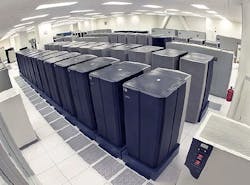I’ve discussed why cyber security is so important to the trucking industry in this space before, but as this is National Cyber Security Awareness Month (didn’t know that, did you?) it’s wise to take a fresh look at this critical topic.
I mean, let’s face it: everything is going digital, much as myself and similarly-styled Luddites hate it. Almost every company now – from banks to power utilities and your friendly local tax collector – is doing everything in its power to get customers to pay bills online. Highway toll collection is increasing going all-electronic, as are speeding and red light enforcement efforts. Even my children’s school textbooks are moving to an online format. (But will they get a “no homework” pass if the power goes out, one wonders …)
Yet all these digital networks and electronic databases are anything but safe. Identity theft is rampant and seems to be worsening all the time as (you guessed it) crooks use ever-more sophisticated technology to conduct their crimes. That’s even before you start delving into national cyber security issues, such as the recent China-based hack attempt on the White House.Look at the results of security system provide nCircle’s 2012 Federal Information Security Oversight and Legislation Trend study released last month for examples of the cyber security problems our nation faces.
The company surveyed over 100 people serving in the federal information technology [IT] security ranks, including senior management, IT operations, security professionals, and risk and audit managers from government agencies and contractor organizations.
They were asked to provide their opinions on the current threat landscape in the federal government and to give insights into information security oversight and legislation. Here are some of the results:
- Of the three distinct categories of attackers, 46% of respondents believe cyber crime is the most significant security threat, 40% believe nation-states are the most significant security threat, and 14% believe “hacktivism” (committing computer hacking crimes as a form of political protest) threats are the most significant.
- Respondents believe that advanced persistent threats pose a greater risk to the public sector.
- 93% of respondents believe data breaches will increase this year.
- 58% of respondents believe government should not regulate cyber security for the private sector.
- 70% say proposed legislation will not improve cyber security in the private sector.
- At least one-third of agencies report they have not yet participated in a CyberStat Review session. Only 8% of those who have participated in a CyberStat review say it has improved their agency’s overall security performance.
- Limited budgets are the greatest challenge for the implementation of continuous monitoring programs.
- 49% of respondents recognize that their agency’s continuous monitoring efforts to date have not resulted in measurable reduction of risk.
Now let’s return to the NCSA cyber security survey noted at the top of this post. That one examined broader issues and trends among the American population, and although the survey is only based on the responses of 1,000 people, the findings are still instructive for an array of businesses, including trucking:
The upshot of all this is quite simple to distill, according to Michael Kaiser (at right), NCSA’s executive director. “The Internet is central to our daily lives and our economy,” he emphasizes. “It is a shared resource for so many of our daily activities, which is why protecting it is a shared responsibility.
To that end, NCSA offers five simple pieces of advice:
- Keep a Clean Machine. Keep security software current: Having the latest security software, Web browser, and operating system are the best defenses against viruses, malware, and other online threats.
- Own your Online Presence. When available, set the privacy and security settings on websites to your comfort level for information sharing. It's ok to limit who you share information with.
- Make Passwords Long, Strong and Unique. Combine capital and lowercase letters with numbers and symbols to create a more secure password. Have a different password for each account.
- Protect all Devices that Connect to the Internet. Along with computers, smart phones, gaming systems, and other Web-enabled devices also need protection from viruses and malware.
- Connect with Care. Get savvy about Wi-Fi hotspots and when banking and shopping, check to be sure the sites security is enabled.
“Everyone should take security measures, understand the consequences of their actions and behaviors and enjoy the benefits of the Internet,” Kaiser added. “If we each do our part to stay safe online the Internet will continue to become a safer and more secure environment.”
And with ever more information being transferred to electronic mediums in the trucking business, that’s advice carriers should heed.



